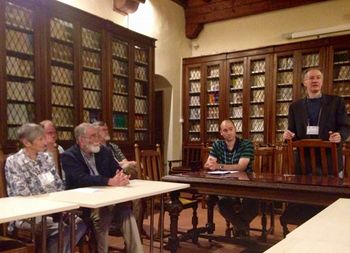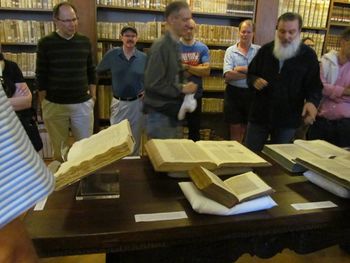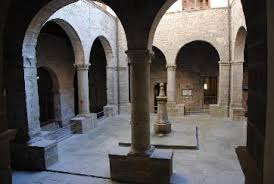Difference between revisions of "John the Jew: Reading the Gospel of John’s Christology as a Form of Jewish Messianism / 6th Nangeroni Meeting (2016 Camaldoli), conference"
| (15 intermediate revisions by 5 users not shown) | |||
| Line 1: | Line 1: | ||
[[File:Foresteria Camaldoli.jpg|thumb|350px]] | [[File:6th Nangeroni Monastero.jpg|thumb|350px|Opening session at the library of the Camaldoli Monastery]] | ||
[[File:6th Nangeroni Eremo.jpg|thumb|350px|Visiting the rare manuscripts library at the Camaldoli Hermitage]] | |||
[[File:Foresteria Camaldoli.jpg|thumb|350px|The Foresteria of the Monastery]] | |||
[[File:Boccaccini.jpg|thumb|150px|[[Gabriele Boccaccini]], University of Michigan]] | [[File:Boccaccini.jpg|thumb|150px|[[Gabriele Boccaccini]], University of Michigan]] | ||
[[File:Reynolds.jpg|thumb|150px|[[Benjamin E. Reynolds]], Tyndale University College]] | [[File:Reynolds.jpg|thumb|150px|[[Benjamin E. Reynolds]], Tyndale University College]] | ||
| Line 5: | Line 7: | ||
'''John the Jew: Reading the Gospel of John's Christology as a Form of Jewish Messianism''' (2016) is the topic of the sixth conference in the series of [[Nangeroni Meetings]] organised by the [[Enoch Seminar]] at Monastery of Camaldoli, near Arezzo, Italy (June 19 - 24, 2016). | '''John the Jew: Reading the Gospel of John's Christology as a Form of Jewish Messianism''' (2016) is the topic of the sixth conference in the series of [[Nangeroni Meetings]] organised by the [[Enoch Seminar]] at Monastery of Camaldoli, near Arezzo, Italy (June 19 - 24, 2016). | ||
< [[First Nangeroni Meeting|1st (Milan 2012)]] -- [[Second Nangeroni Meeting|2nd (Israel 2014)]] -- [[Third Nangeroni Meeting|3rd (Rome 2014)]] -- [[Fourth Nangeroni Meeting|4th (Milan 2015)]] -- [[Fifth Nangeroni Meeting|5th (Naples 2015)]] -- '''6th (Camaldoli 2016)''' -- [[Seventh Nangeroni Meeting|7th (Rome 2016)]] -- [[Eighth Nangeroni Meeting|8th (Florence 2017)]] -- [[Ninth Nangeroni Meeting|9th (Milan 2018)]] -- [[Tenth Nangeroni Meeting|10th (Rome 2018)]] > | |||
==Sixth Nangeroni Meeting (Camaldoli, Italy; June 19 - June 24, 2016)== | ==Sixth Nangeroni Meeting (Camaldoli, Italy; June 19 - June 24, 2016)== | ||
| Line 24: | Line 29: | ||
#Andrew Byers, Durham University, UK | #Andrew Byers, Durham University, UK | ||
#James Charlesworth, Princeton University, USA | #James Charlesworth, Princeton University, USA | ||
#Wally | #Wally Cirafesi, University of Oslo, Norway | ||
#Kelley Coblentz-Bautch, St. Edward's University, USA | #Kelley Coblentz-Bautch, St. Edward's University, USA | ||
#James Davila | #James Davila, University of St. Andrews, UK | ||
#Douglas Estes | #Douglas Estes, South University, USA | ||
#Crispin Fletcher-Louis | #Crispin Fletcher-Louis, Whymanity Research and Training, UK | ||
#Deborah Forger, University of Michigan, USA | #Deborah Forger, University of Michigan, USA | ||
#Charles Gieschen | #Charles Gieschen, Concordia Theological Seminary, USA | ||
#Robert Hall | #Robert Hall, Hampden Sydney College, USA | ||
#Matthias Henze | #Matthias Henze, Rice University, USA | ||
#Angela Kim Harkins | #Angela Kim Harkins, Boston College School of Theology and Ministry, USA | ||
#Giovanni Ibba, Central Italy Theological Seminary, Italy | #Giovanni Ibba, Central Italy Theological Seminary, Italy | ||
#Jonathan Lo | #Jonathan Lo, Hong Kong Baptist Theological Seminary, Hong Kong | ||
#William Loader | #William Loader, Murdoch University, Australia | ||
#Grant Macaskill | #Grant Macaskill, University of Aberdeen, Scotland | ||
#Paul Mandel | #Paul Mandel, Hebrew University of Jerusalem, Israel | ||
#Mary Marshall | #Mary Marshall, Murdoch University, Australia | ||
#James McGrath | #James McGrath, Butler University, USA | ||
#Jocelyn McWhirter | #Jocelyn McWhirter, Albion College, USA | ||
#Marida Nicolaci | #Marida Nicolaci, Facoltà Teologica di Sicilia, Italy | ||
#Chad Pierce | #Chad Pierce, Faith Christian Reformed Church, USA | ||
#Adele Reinhartz | #Adele Reinhartz, University of Ottawa, Canada | ||
#Benjamin Reynolds | #Benjamin Reynolds, Tyndale University College, Canada | ||
#John Ronning | #John Ronning, Faith Theological Seminary, USA | ||
#Shayna Sheinfeld | #Shayna Sheinfeld, Centre College, USA | ||
#Beth Stovell | #Beth Stovell, Ambrose University, Canada | ||
#Andrea Taschl-Erber | #Andrea Taschl-Erber, Graz/Alttestamentliche Bibelwissenschaft, Austria | ||
#Meredith J.C. Warren, University of Sheffield, UK | |||
#Meredith J.C. Warren | #Catrin Williams, University of Wales Trinity Saint David, Wales, UK | ||
#Catrin Williams, | #Urban von Wahlde, Loyola University of Chicago, USA | ||
#Urban von Wahlde | #Joel Willits, North Park University, USA | ||
#Joel Willits | #Ziony Zevit, American Jewish University, USA | ||
#Ziony Zevit | #Ruben Zimmermann, Johannes Gutenberg-University of Mainz, Germany | ||
#Ruben Zimmermann | |||
Purpose: The purpose of the sixth Nangeroni meeting is to explore the Gospel of John’s christology, traditionally considered to be “high christology,” as part of the diversity of Jewish messianism within the Second Temple Period. The focus of discussions will address John’s depiction of the messiah in relation to the following topics: “divinity” and a divine messiah, the Incarnation, wisdom traditions, Enoch traditions and the Son of Man, Davidic expectations, and Moses and Torah. The following questions will serve to guide our sessions: How and in what ways can the Gospel of John’s messiah be situated within Second Temple Period Judaism? Can John’s christology be seen as a part the diversity of Jewish messianism? If so, should it still be labeled a high christology? Can the Johannine messiah be considered “divine”? Were there other divine messiahs in Second Temple Judaism? What do we mean by “divine” and “divinity”? Is there a relationship between John’s λόγος and the Jewish sapiential tradition? What, if any, sort of relationship exists between Second Temple interpretations of the “one like a son of man,” particularly in the Parables of Enoch, and what we find in the Gospel of John? How do Nathanael and the Jerusalem crowd’s “King of Israel” and Pilate’s “King of the Jews” influence our perspectives on Davidic/kingship traditions in Second Temple Judaism, especially in light of Roman rule? How do the Moses traditions in the Gospel of John add to our understanding of prophetic messiah expectations of the time? | Purpose: The purpose of the sixth Nangeroni meeting is to explore the Gospel of John’s christology, traditionally considered to be “high christology,” as part of the diversity of Jewish messianism within the Second Temple Period. The focus of discussions will address John’s depiction of the messiah in relation to the following topics: “divinity” and a divine messiah, the Incarnation, wisdom traditions, Enoch traditions and the Son of Man, Davidic expectations, and Moses and Torah. The following questions will serve to guide our sessions: How and in what ways can the Gospel of John’s messiah be situated within Second Temple Period Judaism? Can John’s christology be seen as a part the diversity of Jewish messianism? If so, should it still be labeled a high christology? Can the Johannine messiah be considered “divine”? Were there other divine messiahs in Second Temple Judaism? What do we mean by “divine” and “divinity”? Is there a relationship between John’s λόγος and the Jewish sapiential tradition? What, if any, sort of relationship exists between Second Temple interpretations of the “one like a son of man,” particularly in the Parables of Enoch, and what we find in the Gospel of John? How do Nathanael and the Jerusalem crowd’s “King of Israel” and Pilate’s “King of the Jews” influence our perspectives on Davidic/kingship traditions in Second Temple Judaism, especially in light of Roman rule? How do the Moses traditions in the Gospel of John add to our understanding of prophetic messiah expectations of the time? | ||
| Line 128: | Line 132: | ||
**Beth Stovell, "Son of God as the Anointed One?: Johannine Davidic Christology and Second Temple Messianism" | **Beth Stovell, "Son of God as the Anointed One?: Johannine Davidic Christology and Second Temple Messianism" | ||
**Joel Willits, "David’s Sublation of Moses: A Davidic Explanation for the Mosaic Christology of the Fourth Gospel" | **Joel Willits, "David’s Sublation of Moses: A Davidic Explanation for the Mosaic Christology of the Fourth Gospel" | ||
**Marida Nicolaci, "Kingship | **Marida Nicolaci, "Divine Kingship and Jesus' Identity in Johannine Messianism" | ||
**Meredith Warren, "'When the Christ appears, will he do more signs than this man has done?' (John 7:31): Signs and the Messiah in the Gospel of John" | **Meredith Warren, "'When the Christ appears, will he do more signs than this man has done?' (John 7:31): Signs and the Messiah in the Gospel of John" | ||
| Line 143: | Line 147: | ||
''9:00–10:15'' – '''Reading session''' | ''9:00–10:15'' – '''Reading session''' | ||
*(a) Text: John 1:1-34 | *(a) Text: John 1:1-34 | ||
**Reader - | **Reader - John Ronning | ||
*(b) Text: John 1:35-51 | *(b) Text: John 1:35-51 | ||
**Reader - Matthias Henze | **Reader - Matthias Henze | ||
| Line 175: | Line 179: | ||
**Reader - Kelley Coblentz Bautch | **Reader - Kelley Coblentz Bautch | ||
*(c) Text: John 12:27-50 | *(c) Text: John 12:27-50 | ||
**Reader - | **Reader - Joel Willits | ||
| Line 188: | Line 192: | ||
''14:30-16:00'' - '''Short Papers''' | ''14:30-16:00'' - '''Short Papers''' | ||
*Group A: Chair - Deborah Forger | *Group A: Chair - Deborah Forger | ||
**Shayna Sheinfeld, "2 Baruch | **Shayna Sheinfeld, "The Light Incarnate: An Exploration of Light in 2 Baruch and in the Gospel of John" | ||
**Matthias Henze, "John’s Christology: A Comparative Reading with 2 Baruch" | **Matthias Henze, "John’s Christology: A Comparative Reading with 2 Baruch" | ||
**Robert Hall, "Parables of Enoch, Ascension of Isaiah, and John: | **Robert Hall, "Parables of Enoch, Ascension of Isaiah, and John: Snatches of an Ancient Conversation" | ||
*Group B: Chair - | *Group B: Chair - | ||
| Line 208: | Line 212: | ||
''09:00–10:30'' – '''Short Papers ''' | ''09:00–10:30'' – '''Short Papers ''' | ||
*Group A: Chair - | *Group A: Chair - Paul Mandel | ||
**Wally Cirafesi, "1 Enoch, the ‘Temple Stone’ from the Magdala Synagogue, and a Priestly Son of Man in John 6:25–71: A Proposal" | **Wally Cirafesi, "1 Enoch, the ‘Temple Stone’ from the Magdala Synagogue, and a Priestly Son of Man in John 6:25–71: A Proposal" | ||
**Douglas Estes, "A Little 'Light' Christology: Jewish Messianism, the Stone of Magdala, and the Prologue of John" | **Douglas Estes, "A Little 'Light' Christology: Jewish Messianism, the Stone of Magdala, and the Prologue of John" | ||
| Line 215: | Line 219: | ||
*Group B: Chair - Shayna Sheinfeld | *Group B: Chair - Shayna Sheinfeld | ||
**Andrea Taschl-Erber, "Christological Transformation of the Motif of “Living Water” (John 4; 7): Prophetic Messiah Expectations and Sapiental Tradition" | **Andrea Taschl-Erber, "Christological Transformation of the Motif of “Living Water” (John 4; 7): Prophetic Messiah Expectations and Sapiental Tradition" | ||
**Deborah Forger, " | **Deborah Forger, "Reading the Gospel of John in Light of Philo of Alexandria: How Jesus’s λόγοι position him as the Messiah and as God" | ||
**Andrew Byers, "The One Lord and One People of the One God: The Fourth Gospel’s Vision of a Divine Messiah and a Divinized Israel" | **Andrew Byers, "The One Lord and One People of the One God: The Fourth Gospel’s Vision of a Divine Messiah and a Divinized Israel" | ||
Latest revision as of 17:25, 7 August 2017
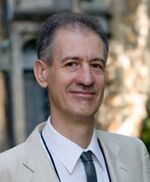

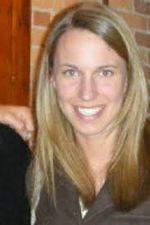
John the Jew: Reading the Gospel of John's Christology as a Form of Jewish Messianism (2016) is the topic of the sixth conference in the series of Nangeroni Meetings organised by the Enoch Seminar at Monastery of Camaldoli, near Arezzo, Italy (June 19 - 24, 2016).
< 1st (Milan 2012) -- 2nd (Israel 2014) -- 3rd (Rome 2014) -- 4th (Milan 2015) -- 5th (Naples 2015) -- 6th (Camaldoli 2016) -- 7th (Rome 2016) -- 8th (Florence 2017) -- 9th (Milan 2018) -- 10th (Rome 2018) >
Sixth Nangeroni Meeting (Camaldoli, Italy; June 19 - June 24, 2016)
Conference Committee: Gabriele Boccaccini, Benjamin E. Reynolds, and Deborah Forger
Preliminary Information
When: June 19 - June 24, 2016
Location of Seminar: Monastero di Camaldoli, near Arezzo, Italy (Località Camaldoli, 52010 Camaldoli)
Confirmed Participants:
- Paul Anderson, George Fox University, USA
- Gabriele Boccaccini, University of Michigan, USA
- Christiane Bramkamp, WWU Muenster, Germany
- Jo-Ann Brant, Goshen College, USA
- Andrew Byers, Durham University, UK
- James Charlesworth, Princeton University, USA
- Wally Cirafesi, University of Oslo, Norway
- Kelley Coblentz-Bautch, St. Edward's University, USA
- James Davila, University of St. Andrews, UK
- Douglas Estes, South University, USA
- Crispin Fletcher-Louis, Whymanity Research and Training, UK
- Deborah Forger, University of Michigan, USA
- Charles Gieschen, Concordia Theological Seminary, USA
- Robert Hall, Hampden Sydney College, USA
- Matthias Henze, Rice University, USA
- Angela Kim Harkins, Boston College School of Theology and Ministry, USA
- Giovanni Ibba, Central Italy Theological Seminary, Italy
- Jonathan Lo, Hong Kong Baptist Theological Seminary, Hong Kong
- William Loader, Murdoch University, Australia
- Grant Macaskill, University of Aberdeen, Scotland
- Paul Mandel, Hebrew University of Jerusalem, Israel
- Mary Marshall, Murdoch University, Australia
- James McGrath, Butler University, USA
- Jocelyn McWhirter, Albion College, USA
- Marida Nicolaci, Facoltà Teologica di Sicilia, Italy
- Chad Pierce, Faith Christian Reformed Church, USA
- Adele Reinhartz, University of Ottawa, Canada
- Benjamin Reynolds, Tyndale University College, Canada
- John Ronning, Faith Theological Seminary, USA
- Shayna Sheinfeld, Centre College, USA
- Beth Stovell, Ambrose University, Canada
- Andrea Taschl-Erber, Graz/Alttestamentliche Bibelwissenschaft, Austria
- Meredith J.C. Warren, University of Sheffield, UK
- Catrin Williams, University of Wales Trinity Saint David, Wales, UK
- Urban von Wahlde, Loyola University of Chicago, USA
- Joel Willits, North Park University, USA
- Ziony Zevit, American Jewish University, USA
- Ruben Zimmermann, Johannes Gutenberg-University of Mainz, Germany
Purpose: The purpose of the sixth Nangeroni meeting is to explore the Gospel of John’s christology, traditionally considered to be “high christology,” as part of the diversity of Jewish messianism within the Second Temple Period. The focus of discussions will address John’s depiction of the messiah in relation to the following topics: “divinity” and a divine messiah, the Incarnation, wisdom traditions, Enoch traditions and the Son of Man, Davidic expectations, and Moses and Torah. The following questions will serve to guide our sessions: How and in what ways can the Gospel of John’s messiah be situated within Second Temple Period Judaism? Can John’s christology be seen as a part the diversity of Jewish messianism? If so, should it still be labeled a high christology? Can the Johannine messiah be considered “divine”? Were there other divine messiahs in Second Temple Judaism? What do we mean by “divine” and “divinity”? Is there a relationship between John’s λόγος and the Jewish sapiential tradition? What, if any, sort of relationship exists between Second Temple interpretations of the “one like a son of man,” particularly in the Parables of Enoch, and what we find in the Gospel of John? How do Nathanael and the Jerusalem crowd’s “King of Israel” and Pilate’s “King of the Jews” influence our perspectives on Davidic/kingship traditions in Second Temple Judaism, especially in light of Roman rule? How do the Moses traditions in the Gospel of John add to our understanding of prophetic messiah expectations of the time?
Registration
Participation in the sixth Nangeroni Meeting is by invitation only. If you are interested in joining the meeting, please contact the organizers.
The registration fee is based on the number of Enoch Seminars/Nangeroni Meetings you have attended in the past:
$125 – Newcomers; $110 – Attended 1 Seminar; $100 – Attended 2 Seminars; $90 – Attended 3 Seminars; $75 – Attended 4 or 5 Seminars + all emeriti; $0 – Attended 6 or more Enoch Seminars or Nangeroni Meetings
Accommodations
The rate for All-inclusive accommodations at Camaldoli is as follows:
300 Euros - All Participants; 200 Euros - Respondents; 0 Euros - Major Paper Presenters
Travel Information
You may fly into either Florence, Rome, or Bologna. Then take the train to Arezzo.
From Florence (Peretola), you will need to take a bus/cab to the main train station, Santa Maria Novella, then the train to Arezzo. From Rome (Fiumicino), you will take the train to Roma Termini, then to Arezzo. From Bologna (Guglielmo Marconi), you will take the bus/taxi to Bolgona Centrale and from there to Arezzo. Try to avoid local trains which stop at every station and therefore take much longer. Look for high-speed, intercity, or frecciarosa trains.
We will be scheduling a bus to take us from the Railway Station in Arezzo to Camalodoli at 5:00pm, June 19. There is a cafe in the Railway Station where folks have congregated in the past as they waited for the bus, so that will serve as our meeting point. If you are unable to make this bus, you can take the train from Arezzo to Bibbiena. From Bibbiena, you can take a taxi to Camaldoli (~20-30 euros); however, on a Sunday night, you may have difficulty locating a taxi in Bibbiena. You may also take a taxi directly from Arezzo to Camaldoli, but this will be more expensive (about 80+ euros)."
Provisional Schedule
Sunday, June 19––––––––––––––––––––––––––––––––––––––––––––––––––––––––––––––––––––––––––––––––––––––––––––
Arrivals - Bus from the Arezzo Railway Station (5pm). Meet at the cafe in the train station.
7:30pm Dinner
8:30pm Welcome
Monday, June 20--------------------------------------------------------------------------
8 to 9am - Breakfast
09:00–10:15 – Introduction:
Chair: Gabriele Boccaccini
- Benjamin Reynolds "The Gospel of John's Christology as Evidence for Second Temple Jewish Messianic Expectation: Challenges and Possibilities"
- James McGrath "The Gospel of John as Jewish Messianism: Formative Influences and Negative Avenues in the History of Scholarship"
10:45–12:30 – Session 1:
Chair: Benjamin Reynolds
Gabriele Boccaccini "How Jesus Became Uncreated" - Respondent: Paul Anderson
13:00 - Lunch - - - - - - - - - - - - - - - - - - - - - - - - - - - - - - - - - - - - - - - - - - - - - - - - - - - - - - - - - - - - - - - - - - - - - - - - - - - - - - - - - - - - - - -
14:30–16:00 – Short Papers
- Group A: Chair - Kelley Coblentz Bautch
- Jocelyn McWhirter, "Searching the Scriptures: Messianic Exegesis in the Fourth Gospel"
- Paul Mandel, "The Exegesis of God: John 1:18 in Light of Jewish Traditional Practice"
- Jo-Ann Brant, "Johannine Christology: Sacred Time, Sacred Space, Sacred Body"
- Group B: Chair - Robert Hall
- Beth Stovell, "Son of God as the Anointed One?: Johannine Davidic Christology and Second Temple Messianism"
- Joel Willits, "David’s Sublation of Moses: A Davidic Explanation for the Mosaic Christology of the Fourth Gospel"
- Marida Nicolaci, "Divine Kingship and Jesus' Identity in Johannine Messianism"
- Meredith Warren, "'When the Christ appears, will he do more signs than this man has done?' (John 7:31): Signs and the Messiah in the Gospel of John"
16:30–18:15 – Session 2:
Chair: Benjamin Reynolds
Adele Reinhartz "'And the Word was God': John’s Christology and Jesus’ Discourse in Jewish Context" - Respondent: Matthias Henze
19:30 - Dinner
Tuesday, June 21––––––––––––––––––––––––––––––––––––––––––––––––––––––––––––––––––––––––––––––––––––––––––––
9:00–10:15 – Reading session
- (a) Text: John 1:1-34
- Reader - John Ronning
- (b) Text: John 1:35-51
- Reader - Matthias Henze
- (c) Text: John 7:10-44
- Reader - Jo-Ann Brant
10:45–12:30 – Session 3:
Chair: Gabriele Boccaccini
William Loader "Wisdom and Logos Traditions in Judaism and John’s Christology" -- Respondent: Grant Macaskill
13:00 - Lunch
< afternoon > Visit to the Eremo of Camaldoli and its Ancient Library.
17:45–19:30 – Session 4:
Chair: Benjamin Reynolds
Charles Gieschen "The Divine Name that the Son Shares with the Father in the Gospel of John" -- Respondent: Chad Pierce
19:30 - Dinner
Wednesday, June 22–––––––––––––––––––––––––––––––––––––––––––––––––––––––––––––––––––––––––––––––––––––––––
09:00–10:15 – Reading Session
- (a) Text: John 5:17-47
- Reader - Shayna Sheinfeld
- (b) Text: John 4:1-42
- Reader - Kelley Coblentz Bautch
- (c) Text: John 12:27-50
- Reader - Joel Willits
10:45–12:30 – Session 5:
Chair: Gabriele Boccaccini
Crispin Fletcher-Louis "Jesus is 'Equal with God' because Son of God is the Son of Man (John 5)" - Respondent: Benjamin Reynolds
13:00 - Lunch
14:30-16:00 - Short Papers
- Group A: Chair - Deborah Forger
- Shayna Sheinfeld, "The Light Incarnate: An Exploration of Light in 2 Baruch and in the Gospel of John"
- Matthias Henze, "John’s Christology: A Comparative Reading with 2 Baruch"
- Robert Hall, "Parables of Enoch, Ascension of Isaiah, and John: Snatches of an Ancient Conversation"
- Group B: Chair -
- John Ronning, "The 'High and Lifted Up' Son of Man Christology of John’s Gospel"
- Jonathan Lo, "The “Son of Man” and the Characterization of Jesus in John’s Gospel"
- Mary J. Marshall, "The Translocation and Transmutation of the Life-giver in the Fourth Gospel"
16:30–18:15 – Session 6:
Chair: Benjamin Reynolds
Ruben Zimmermann "John and the Divine Bridegroom" -- Respondent: Kelley Coblentz Bautch
19:30 - Dinner
Thursday, June 23–––––––––––––––––––––––––––––––––––––––––––––––––––––––––––––––––––––––––––––––––––––––––––
09:00–10:30 – Short Papers
- Group A: Chair - Paul Mandel
- Wally Cirafesi, "1 Enoch, the ‘Temple Stone’ from the Magdala Synagogue, and a Priestly Son of Man in John 6:25–71: A Proposal"
- Douglas Estes, "A Little 'Light' Christology: Jewish Messianism, the Stone of Magdala, and the Prologue of John"
- Urban von Wahlde, "Before Jesus 'Died for Our Sins': Evidence for a Purely Jewish Interpretation of the Ministry of Jesus at One Stage in the Development of the Gospel of John"
- Group B: Chair - Shayna Sheinfeld
- Andrea Taschl-Erber, "Christological Transformation of the Motif of “Living Water” (John 4; 7): Prophetic Messiah Expectations and Sapiental Tradition"
- Deborah Forger, "Reading the Gospel of John in Light of Philo of Alexandria: How Jesus’s λόγοι position him as the Messiah and as God"
- Andrew Byers, "The One Lord and One People of the One God: The Fourth Gospel’s Vision of a Divine Messiah and a Divinized Israel"
11:00–12:45 – Session 7:
Chair: Gabriele Boccaccini
Catrin Williams "Johannine Christology and Prophetic Traditions: The Case of Isaiah" -- Respondent: James Davila
13:00 – Lunch
14:30-16:00 - Session 8 :
Chair: Benjamin Reynolds
James Charlesworth "Dead Sea Messianism and John's Christology" -- Respondent: Angela Kim Harkins
16:30–18:15 – Conclusion; Wrap-up session : Gabriele Boccaccini and Benjamin Reynolds
19:30 - Dinner
Friday, June 24–––––––––––––––––––––––––––––––––––––––––––––––––––––––––––––––––––––––––––––––––––––––––––––-
Bus to Arezzo Railway Station. We will aim to be back in Arezzo by 9am.
